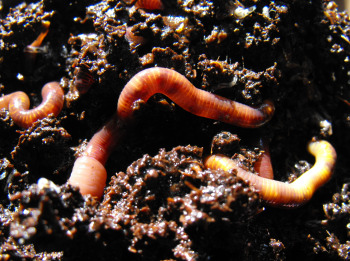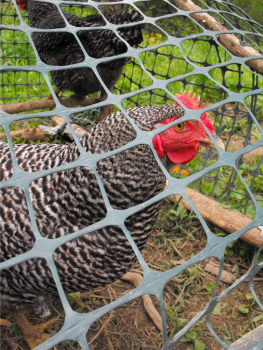
Find sources of fertility
 Unless
you happen to have bought a farm from an organic gardener, chances are
that fertility should be your first concern when it comes to
gardening. Although I don't recommend that beginning homesteaders
do much in the way of livestock, I do believe that everyone should
start a worm
bin immediately. Worms take nearly no time and create some
high quality compost to get you started.
Unless
you happen to have bought a farm from an organic gardener, chances are
that fertility should be your first concern when it comes to
gardening. Although I don't recommend that beginning homesteaders
do much in the way of livestock, I do believe that everyone should
start a worm
bin immediately. Worms take nearly no time and create some
high quality compost to get you started.
If you have a half hour per day to put into
the operation, I also recommend that you build
a chicken tractor with two to five chickens in it. (Start
small!) You can use the chicken
tractor to add fertility to worn out parts of the soil while you
start gardening in higher quality areas.

Next, start scrounging for free fertility in the surrounding
area. If you live in town or near town, stock up on
garbage bags full of leaves in the fall. If you're out in the
country, start asking your livestock-owning neighbors what they do with
their manure.
Chances are they'll give it to you for free if you haul it away.
If your farm has a large wooded area attached, you should also go out
hunting stump
dirt, which is some of the best potting soil around.
Stop and chat with the tree cutting folks and ask them if they will
dump some mounds of wood chips in your yard --- they often need a way
to dispose of these chips and will give them to you for free. Be
aware that you need to let wood chips rot for a couple of years before
using them as mulch.
Building the fertility of your soil is a long term investment in your
land. Not only that, mulch will cut your weeding work in half
while increasing yields. You will have a better garden in the
long run if you hunt down fertility sources before planting a huge
garden.
| This post is part of our Starting Out on the Homestead lunchtime
series.
Read all of the entries: |
Want more in-depth information? Browse through our books.
Or explore more posts by date or by subject.
About us: Anna Hess and Mark Hamilton spent over a decade living self-sufficiently in the mountains of Virginia before moving north to start over from scratch in the foothills of Ohio. They've experimented with permaculture, no-till gardening, trailersteading, home-based microbusinesses and much more, writing about their adventures in both blogs and books.
Want to be notified when new comments are posted on this page? Click on the RSS button after you add a comment to subscribe to the comment feed, or simply check the box beside "email replies to me" while writing your comment.
